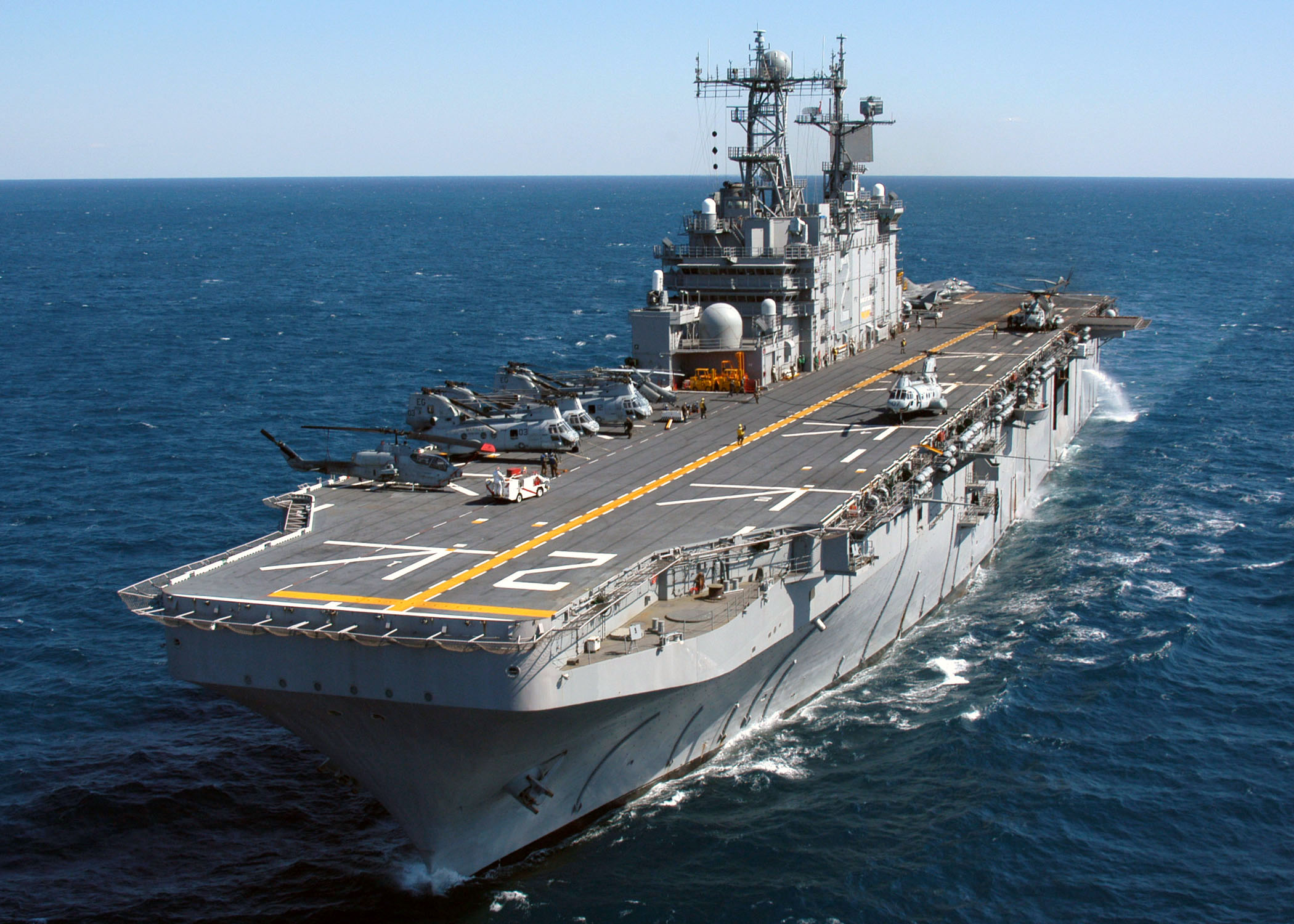
The USS Saipan during Expeditionary Strike Group integration training in 2004.
I hear that Marcel Proust’s hero is plummeted into the past after eating a wafer whose French name sounds like my cousin Madeline, the wife of an Italian butcher in Jerseyville, Illinois. It is going to be music, not cookies, for my plunges into the past. I recently listened to Richard and Linda Thompson’s Shoot Out the Lights, released on their producer Joe Boyd’s Hannibal Records in 1982, when I was a high school sophomore in Granite City, Illinois. A gushing Rolling Stone review sent me to the local record store—even in Granite City, there was a hip record store clerk who would special-order anything on the planet. By the time I was plunging through the Mediterranean Sea on the USS Saipan as a freshly deployed midshipman in the summer of 1985, every track on Shoot Out the Lights had been grooved into my brain. This was long before the era of earbuds, cell phones, and streaming media. When I went to sea, you had to remember the music you wanted to hear in your head.
I had forgotten how much I needed to hear “Just the Motion” from Shoot Out the Lights in the summer of 1985. It is one of those revenant acoustic Richard Thompson songs that Linda sings like she is the only ghost with the voice to break its silence. Their songs “Down Where the Drunkards Roll” and “Withered and Died” (from another record, I Want to See the Bright Lights Tonight) haunt me even more deeply to my core, but they are songs of the land (drunkards rolling around on the ground, dreams dying like flowers in the dirt), whereas “Just the Motion” is lost at sea, just like me in the summer of 1985.
Prompted by this memory to muse about Richard Thompson and the ocean, I looked and learned that you can book a cruise of the Adriatic Sea with him on Harmony Voyages (sailing out of landlocked Langho, UK) for August 23-30, 2025. Online comments about past cruises indicate that Mr. Thompson is by now an old salt on sea-going tours, so he knows that unfathomable feeling when your body is being moved along in the ocean by a vessel that is being moved about by that same ocean. It is like experiencing octaves of the ocean in your bowels.
Harmony Voyages is booking 200 paying guests for the August 2025 Richard Thompson cruise, whereas the Saipan transported nearly 3,000 paid sailors, Marines, and midshipmen like me, along with a squadron of fighting helicopters and big boats to take Marines ashore. I remember the Saipan as a gray ship the size of a small city. Since decommissioned and scrapped, it was nearly 1,000 feet long and displaced more than 27,000 tons of water. Though he probably has now performed this song while sailing at sea, I doubt when he wrote “Just the Motion” that Richard Thompson had ever felt the bottomless feeling of surging inside the bowels of a giant ship. But his song pacified me, stretched out on my rack, one lost squid (as the Marines dubbed sailors) in an array of metal bunk beds stacked up in an annex of the ship’s vast hospital.
“When you’re rocked on the ocean, rocked up and down,” Linda sang Richard’s words in the grooves of my brain, “don’t worry. When you’re spinning and turning around and around, don’t worry.”
I had my worries at the time. I had decided to kiss the U.S. Navy goodbye after my summer deployment, resign my full-ride scholarship (with stipend) at Boston University rather than commit to three more years of Navy ROTC indoctrination and four years of active duty after I graduated. “It’s a restless wind and a sleepless rain, don’t worry.”
I knew the fatalism at the bottom of “Just the Motion.” We never get to have happy things for long in a Richard Thompson song. Why is it that we should not be worried as we are tossed about on the sea of our troubles? “Because under the ocean at the bottom of the sea, you can’t hear the storm. It’s as peaceful as can be.” I must have been Granite City’s only subscriber to the Richard Thompson fanzine Flypaper, so I had the fan-club-only cassette release of rarities that he titled “Doom and Gloom from the Tomb” to mock his own predilection for bummers, downers and raw deals. But I was propped up, not sucked down, by his song as the Saipan surged along toward Benidorm, Spain.
I would miss the ship’s movement there. The Saipan got on emergency underway—its top-shelf hospital, where I had been sleeping, was its crucial asset in responding to a skyjacking in the region on June 15, 1985. Hezbollah forced the TWA pilot to land Flight 847 in Algiers, right on the other side of the Baleraric Islands from Benidorm. The Saipan and its hospital took unexpectedly to sea while I was dancing, obliviously and awkwardly, in a discotheque packed with Nordic blondes trying to get their grooves back, where I was not supposed to be and where no one from the Saipan could ever have found me.
“Just the Motion” calmed me, that summer at sea. Hearing it now, I remember both being calmed and the uneasy need to be calmed. I remember walking down to the dazzling bay at Benidorm that morning after a long night of futile disco dancing and realizing, no matter how many times I looked out how far into the sea, the Saipan was gone and I was not on it, and the sand beneath my feet seemed so much less steady than the ocean.
